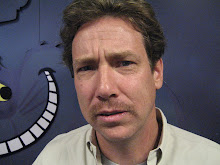Billy the dung beetle’s dad flung open the door to find his son sculpting a naked ladybug. “Holy Christ!” he roared.
“I told you, Dad,” cried Billy’s little brother, hopping from foot to foot just behind his father.
“Yes, thank you, Lance,” said his dad. “Now go back outside. Daylight’s burning.”
“But – “
Billy’s dad shot Lance a look, then stepped into his son’s room and shut the door. “What the hell’s this?” he demanded.
Billy continued fashioning an antenna out of a ball of cattle excrement. “Well, it’s a figure, Dad,” he said. “You know, a statue.”
“A figure! I can see that, Son. God in Heaven.” He grabbed a shirt from the floor and whipped it about the ladybug’s glistening abdomen. “What I mean is, why aren’t you outside rolling? Ricky’s out there. And I saw that friend of yours, Angie. She’s becoming quite the little tunneler.”
Billy fell back onto his bed. “Aw, that stuff’s not for me, Dad. I’m no worker bee. I’m an artist – a real artist. See?” He reached under his bed and dragged out an exquisite reproduction of Notre Dame Cathedral.
“A little church,” his dad said flatly. He laid a foot to each side of the work and rolled it into a pill.
“Dad!”
“It’s for your own good, Son. This artist business – it won’t wash. It’s unseemly.”
Billy began to sniffle.
“Oh, here we go,” moaned his dad. “Here come the waterworks.”
Billy regarded his father through stinging eyes. He could suddenly envision his next project: a simple, narrow-minded elder beetle set upon by a murder of crows.
“I blame your mother for this,” Billy’s father said, settling backward onto a delicate, three-dimensional rendering of da Vinci’s “The Last Supper.” He produced a cigarette from beneath a wing. “’Let’s enroll the boy in tap,’ she said. Then there were the piano lessons. That French tutor.”
“Check out the magazines on his nightstand,” came a voice from the other side of the door.
“Outside, Lance!” yelled Billy’s dad. “Right now.”
Billy tossed his dad the Walter Foster figure-drawing books from beside his bed, then flipped toward the wall. “Excuse me, but there’s no smoking in the studio,” he said, voice breaking. “And I’m not like, gay, Dad, if that’s what you’re insinuating.”
Billy’s dad’s gaze ran from the back of his son’s jaunty blue blazer to his ascot and beret. “Uh-huh,” he said.
“Look, you’re developing into an adult, Son,” he continued. “And an adult doesn’t waste the light of day making little, I don’t know … ”
“Objet d’art, Dad.”
“Exactly – doll houses and whatnot – holed up in his room. Especially when we’ve had a herd of angus move through the area. What you’re doing with manure here, boy, it’s not worthy.”
Now Billy was getting another idea, this one for a performance-art piece. He let his mind run with it. “Allow me to challenge you with this,” he’d recite to a great crowd of admirers including Auguste Rodin. Then he’d rip sheets from sculptures of an insensitive, block-headed patriarch and the youngest of its offspring. Next, as the throng looked on in awe, he’d mold a working shotgun, fill it with pebbles, and fire at the statues until they were reduced to busts.
But Billy hated to work angry. It was not the artist’s way. So he came up with something else, a plan of escape. There must be a hundred art schools that would accept him. Or he’d go to Paris, hire himself a little garret.
Billy’s dad moved to the foot of the bed and sat. “This may surprise you, Boy, but at your age I considered myself quite the painter.”
This was a house of lies. Then again, Billy considered, there was that paint-by-numbers Holstein evacuating its bowels tucked away in the garage.
“It’s true,” Billy’s dad continued. “I had it in my head I was going to leap onto the boot of a passing naturalist and work my way into the city, make a big stink. That was until I had it out with my old man, too.
“He was a roller, he told me. My grandfather was a roller. We’ve all been rollers, this entire family, since the beginning. It’s who we are, he said.”
Billy turned to face his father’s words. “What’d you do with that?”
“What did I do? I scurried the hell out of this place as fast as my legs would carry me. I got beyond the plains, set up shop and, after a while my stuff developed a following. I had fame, all the females I could inseminate – ” he glanced nervously at the door – “not that your mother needs to know.”
In awe Billy slowly nodded his head then quickly switched to shaking it from side to side.
“Point is it wasn’t so great. It wasn’t even good. It’s all crap, Son. All of it. All of the time. What you want is to be happy. And you’ll never be happy until you know who you are.”
Billy studied his dad for a minute. He could see himself in that face. Then he looked about his room, his studio. He got up, arranged his jacket on a wooden hanger in the closet and placed his beret carefully upon a shelf.
“We’d better get outside,” he turned at last to say. “Daylight’s burning.”




